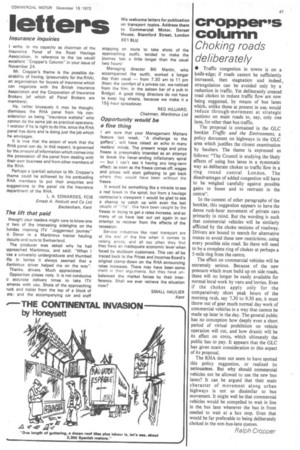cropper's column
Page 49

If you've noticed an error in this article please click here to report it so we can fix it.
Choking roads deliberately
• Traffic congestion in towns is on a knife-edge; if roads cannot be sufficiently increased, then stagnation and indeed, strangulation can be avoided only by a reduction in traffic. Yet deliberately created road chokes to reduce traffic flow are now being suggested, by means of bus lanes which, unlike those at present in use, would reduce through-movement at strategic sections on main roads to, say, only one lane, for other than bus traffic.
The proposal is contained in the GLC booklet Traffic and the Environment, a policy document on highways in the GLC area which justifies the closest examination by hauliers. The theme is expressed as follows: "The Council is studying the likely effects of using bus lanes in a systematic way as deliberate chokes to traffic flow in a ring round central London. The disadvantages of added congestion will have to be weighed carefully against possible gains to buses and to restraint in the centre".
In the context of other paragraphs of the booklet, this suggestion appears to have the dense rush-hour movement of private cars primarily in mind. But the wording is such that commercial vehicles will be similarly afflicted by the choke sections of roadway. Drivers are bound to search for alternative routes to avoid these new restrictions, using every possible side road. So there will need to be a complete ring of chokes at perhaps a 5-mile ring from the centre.
The effect on commercial vehicles will be extremely serious. Because of the new pressure which must build up on side roads, these will no longer be easily available for normal local work by vans and lorries. Even if the chokes apply only for the comparatively short peak hours of the morning rush, say 7.30 to 9.30 am, it must throw out of gear much normal day work of commercial vehicles in a way that cannot be made up later in the day. The general public has no conception how deeply even a short period of virtual prohibition on vehicle operation will cut, and how drastic will be its effect on costs, which ultimately the public has to pay. It appears that the GLC has given scant consideration to this aspect of its proposal.
The RHA.does not seem to have spotted this policy suggestion, or realized its seriousness. But why should commercial vehicles not be allowed to use the new bus lanes? It can be argued that their main character of movement along urban highways is not so dissimilar to bus movement. It might well be that commercial vehicles would be compelled to wait in line in the bus lane whenever the bus in front needed to wait at a bus stop. Even that would be far preferable to being deliberately choked in the non-bus-lane queues.
Ralph Cropper




































































































